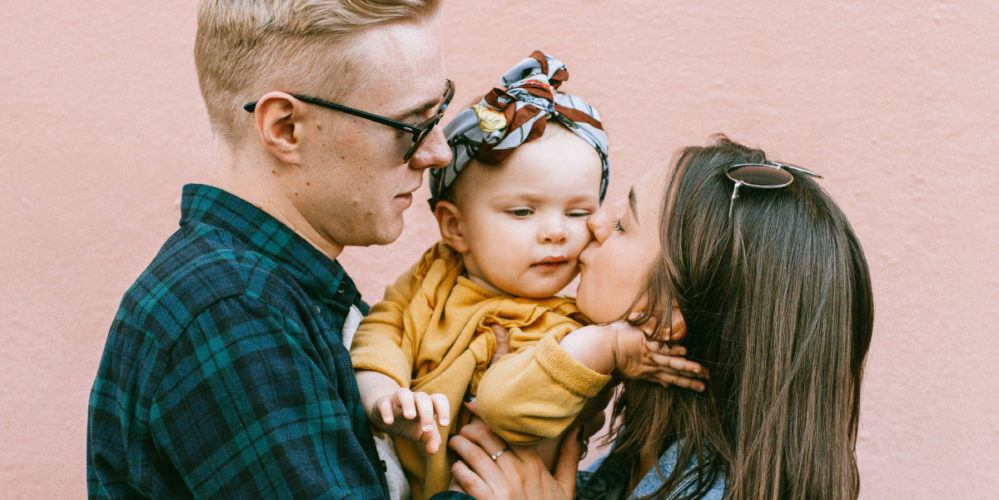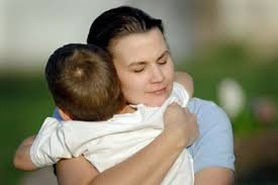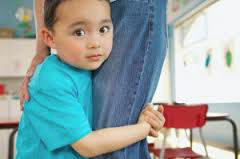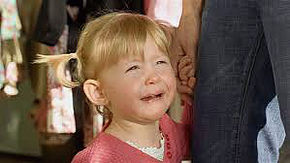Settling Children into Child Care

Settling children into child care can be an exciting, emotional and stressful time – for parents, educators and children! Separation anxiety is a natural stage in children’s development and is actually a normal response in young children that indicates a strong, healthy attachment to their loved ones. Sometimes you can overestimate your child’s ability to cope with the transition into care and it can take you by surprise when your child becomes distressed.
Children can express their distress in a range of ways from a behaviour as simple as crying and clinging when you leave to something as severe as becoming physically sick. The behaviour can last for as short as a few minutes or can last for as long as you are away. Some children do not display any extreme emotions but seem to cope with the situation internally throughout the day until mum or dad return and then they fall to bits! They can even display their distress through anger or distance towards you, as if to punish you for leaving them.
Facts On Infant Separation Anxiety
Separation anxiety peaks between 7-14 months of age. It usually ends around age 2. Before 7 months of age, babies have very little understanding of what is normal, so new situations and experiences don’t frighten them. During this time, they also are becoming comfortable with their parents (especially mum), their home, and the things they see on a daily basis. As babies get a bit older and become more aware, they view any sort of lack of familiarity (new people and new places) as scary and threatening. They know something different is happening and that produces fear.
To master this stage, babies must feel safe at home, trust other people in addition to their parents, and believe that their parents will always come back. It can be challenging for educators if a child in child care is not settling. After all they are a kind, caring and compassionate person. Here are a few tips and strategies to help to support children when settling into care:
Establish good relationships
It is good to visit the educators home often prior to starting care and for short periods where you can stay and play, establishing positive experiences for the child. It is also great for parents to join the educators at playgroups or for the educator to visit the child in the family home. It is important that the child sees that the educator and the parents have a positive, trusting relationship.
Communication is key
Talk together about the child. The educator will need to gather information about your child’s usual routines, special people, places and things and how the child normally likes to be settled when upset. Establish a daily communication tool (either notebook, phone or text) to ensure that relevant information is passed between the educator and parents about how the child has settled, how are they sleeping (in care and at home), how are they eating etc. Asking the educator to phone or text you during the day to reassure you that your child has settled can relieve some anxiety. Communicate with your child also (even infants) to explain what is happening and reassure them that mum (or dad) will be back.
Respect the child’s feelings
Allow the child to feel sad, angry etc. Her emotions are real and they should be allowed to express them. Show empathy, understanding and compassion to acknowledge their feelings of distress instead of trying to dismiss them.
Establish a good transition routine
Work in partnership together (educator and parents) to establish a goodbye routine so the educator can support you to leave, with you knowing they will call the minute your child continues to be distressed. Consistency is key and a short transition time is better than a long drawn out one. Never ever sneak away. A child needs to learn the pattern of saying goodbye and that a parent is returning.
Be prepared
It is good practice for your educator to have favourite activities ready for the child to engage in when they arrive and a quiet, safe space for them to go to if they are feeling overwhelmed. It is also important that they prepare any other children in care about what is happening as it can be a stressful time for them also. Establishing and maintaining settled routines in the place of care for the initial stages of transition is also important.
Special things
Take along any special toys/snugglies/food from home to help them feel a sense of belonging at their child care. A top that mum has worn can be used for infants to snuggle up to or lie on.
Observe and respond
Your educator will spend some time observing your child and getting to know them and their cues. They will observe how you settle and soothe your child. This will enable the child’s educator to recognise when they are becoming distressed and respond appropriately.
Persistence
It can be hard but try and remain calm and consistent as much as possible even if it seems that it is not working. If the child is taking longer to settle than you expected and you still have concerns talk to a Coordinator. It may be that some additional or new strategies can be put into place.
Once a child is settled you will be able to observe a lovely attachment relationship form between the child and their educator.


